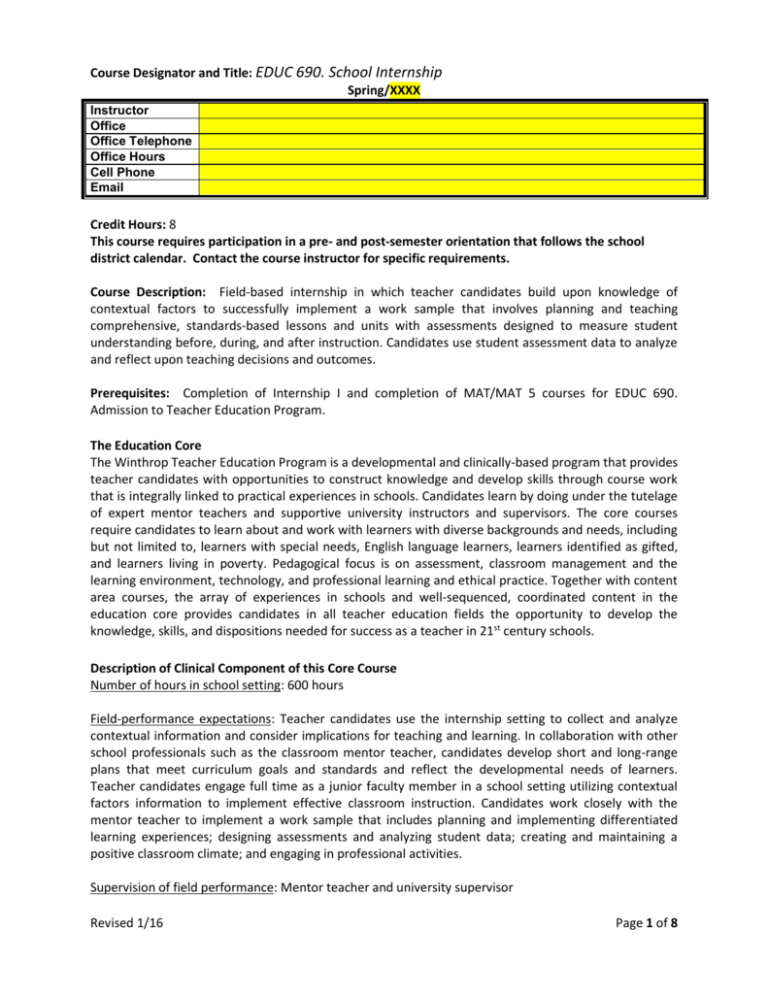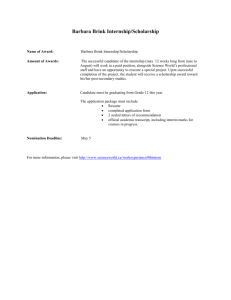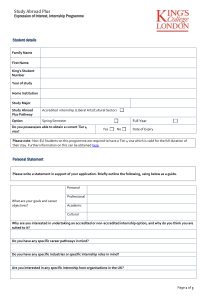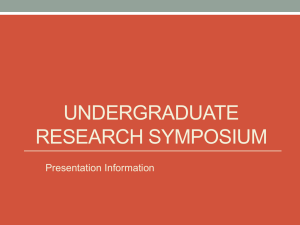Education Core Syllabus Template
advertisement

Course Designator and Title: EDUC 690. School Internship Spring/XXXX Instructor Office Office Telephone Office Hours Cell Phone Email Credit Hours: 8 This course requires participation in a pre- and post-semester orientation that follows the school district calendar. Contact the course instructor for specific requirements. Course Description: Field-based internship in which teacher candidates build upon knowledge of contextual factors to successfully implement a work sample that involves planning and teaching comprehensive, standards-based lessons and units with assessments designed to measure student understanding before, during, and after instruction. Candidates use student assessment data to analyze and reflect upon teaching decisions and outcomes. Prerequisites: Completion of Internship I and completion of MAT/MAT 5 courses for EDUC 690. Admission to Teacher Education Program. The Education Core The Winthrop Teacher Education Program is a developmental and clinically-based program that provides teacher candidates with opportunities to construct knowledge and develop skills through course work that is integrally linked to practical experiences in schools. Candidates learn by doing under the tutelage of expert mentor teachers and supportive university instructors and supervisors. The core courses require candidates to learn about and work with learners with diverse backgrounds and needs, including but not limited to, learners with special needs, English language learners, learners identified as gifted, and learners living in poverty. Pedagogical focus is on assessment, classroom management and the learning environment, technology, and professional learning and ethical practice. Together with content area courses, the array of experiences in schools and well-sequenced, coordinated content in the education core provides candidates in all teacher education fields the opportunity to develop the knowledge, skills, and dispositions needed for success as a teacher in 21st century schools. Description of Clinical Component of this Core Course Number of hours in school setting: 600 hours Field-performance expectations: Teacher candidates use the internship setting to collect and analyze contextual information and consider implications for teaching and learning. In collaboration with other school professionals such as the classroom mentor teacher, candidates develop short and long-range plans that meet curriculum goals and standards and reflect the developmental needs of learners. Teacher candidates engage full time as a junior faculty member in a school setting utilizing contextual factors information to implement effective classroom instruction. Candidates work closely with the mentor teacher to implement a work sample that includes planning and implementing differentiated learning experiences; designing assessments and analyzing student data; creating and maintaining a positive classroom climate; and engaging in professional activities. Supervision of field performance: Mentor teacher and university supervisor Revised 1/16 Page 1 of 8 Description of Course in Relation to Education Core EDUC 690 is a synthesis of the knowledge, skills, and dispositions candidates develop throughout the Education Core. Simultaneous application of instructional, assessment, and management strategies learned and practiced in earlier courses provides the necessary experience for candidate transition into a professional educator. Course Goals, Learning Outcomes, and Assessments Unit Standards/Elements Student Learning Outcomes Key Assessments CG1. Demonstrate knowledge and skill in observation, data collection, and analysis of the internship classroom, school, and community to support long- and short-range planning. US1. Diverse Needs of Learners E2. The teacher candidate SLO1. Uses contextual factors to develop Internship II analyzes relevant motivational long-range goals and to guide instructional Evaluation and contextual factors that planning. influence learning to meet the needs of all learners. US5. Instruction and Learner SLO2. Establishes appropriate standards Internship II Engagement based long-range learning and Evaluation E1. The teacher candidate developmental goals for internship. utilizes knowledge of pedagogical content and SLO3. Identifies and sequences developmental science Internship II instructional units that will lead to the domains to plan and implement Evaluation meeting of learning and developmental learner-centered lessons long-range goals for internship. aligned with curriculum goals and standards. CG2. Design and utilize student assessment data to guide instruction. US4. Assessment E1. The teacher candidate designs, selects, and SLO4. Designs, selects, or modifies Internship II implements valid, reliable, and meaningful assessments that are aligned Evaluation appropriately differentiated with lesson objectives. assessments that are aligned with short and long term goals. SLO5. Uses data from a variety of Internship II formative, diagnostic, and summative US4. Assessment Evaluation E2. The teacher candidate uses assessments to guide instructional planning. data from a variety of formative, diagnostic, and SLO6. Assesses student learning during summative assessments to instruction by using a variety of formative guide instruction, determine assessment strategies with established Internship II impact on learning, performance criteria. Evaluation differentiate instruction, and SLO7. Plans strategies for tracking student accommodate diverse learners. progress and communicating results that reflect student achievement. CG3. Plan, deliver, and assess standards-based instruction that meets diverse learner needs. US5. Instruction and Learner SLO8. Plans standards-based lessons in Internship II Revised 1/16 Page 2 of 8 Engagement E1. The teacher candidate utilizes knowledge of pedagogical content and developmental science domains to plan and implement learner-centered lessons aligned with curriculum goals and standards. US1. Diverse Needs of Learners E3. The teacher candidate plans and implements differentiated learning experiences that address diverse learner needs. US1. Diverse Needs of Learners E4. The teacher candidate maintains high expectations for the achievement of all learners. US3. Technology E1. The teacher candidate models and facilitates effective use of current and emerging digital tools to promote authentic problem solving, support learning, conduct research, and/or engage in creative expression. US3. Technology E3. The teacher candidate models and requires safe, legal, ethical, and appropriate use of digital information and technology. US4. Assessment E3. The teacher candidate effectively and ethically communicates assessment information to learners, parents, guardians, colleagues, and administrators. US5. Instruction and Learner Engagement E2. The teacher candidate motivates learners and engages Revised 1/16 accordance with the requirements of the discipline, including learning objectives that are measurable, appropriate, and align with the standards. Evaluation SLO9. Plans developmentally appropriate and differentiated instruction to address diverse learning needs. Internship II Evaluation SLO10. Differentiates instruction to meet the needs of diverse learners. SLO11. Implements strategies that address the needs of learners from diverse cultural and linguistic backgrounds. SLO12. Effectively communicates appropriately challenging expectations to learners. SLO13. Helps learners assume responsibility for their own learning. SLO14. Plans for the learner use of current and emerging digital tools to support 21st century learning. SLO15. Facilitates learner use of current and emerging digital tools to support 21st century learning. SLO16. Plans for learner use of technology in a safe, legal and appropriate manner. SLO17. Facilitates learner use of technology in a safe, legal and appropriate manner. SLO18. Effectively uses summative assessment strategies and communicates results. Internship II Evaluation Internship II Evaluation Internship II Evaluation Internship II Evaluation Internship II Evaluation Internship II Evaluation Internship II Evaluation Internship II Evaluation Internship II Evaluation SLO19. Provides specific and timely instructional feedback to students pertaining to stated outcomes. Internship II Evaluation SLO20. Demonstrates thorough command of the content taught and appropriately addresses learner questions and misunderstandings related to the content. Internship II Evaluation Page 3 of 8 them in appropriately SLO21. Maximizes learner engagement challenging experiences that during instructional periods, transitions, encourage higher order and activities. thinking. US5. Instruction and Learner Engagement E3. The teacher candidate plans and implements instruction SLO22. Implements instruction that allows that allows learners to reflect learners to reflect on prior content on prior content knowledge, knowledge, and link new concepts to link new concepts to familiar familiar concepts and experiences. concepts and experiences, and use academic language to express content understanding. US6. Literacy E3. The teacher candidate implements, or collaborates SLO23. Collaborates with school with school professionals to professionals to implement appropriate implement, appropriate interventions for learners who struggle in interventions for learners who one or more literacy areas. struggle in one or more literacy areas. US6. Literacy E4. The teacher candidate SLO24. Guides learners to use appropriate provides opportunities within content-specific literacy strategies. the discipline(s) that motivate learners to use literacy skills. CG4. Maintain a positive classroom and school climate. US2. Learning Environment E1. The teacher candidate SLO25. Arranges the environment to identifies factors that promote create or maintain a safe classroom that is a positive, safe, and caring conducive to learning. environment. SLO26. Maintains a caring, fair, and US2. Learning Environment equitable classroom environment. E2. The teacher candidate SLO27. Develops and implements develops and implements a proactive classroom management proactive classroom strategies that promote positive behaviors management plan that and active engagement. promotes positive behaviors, SLO28. Develops a plan for proactive active engagement, and classroom management that promotes respect for individual positive behaviors and maximizes differences. instructional time. SLO29. Uses appropriate voice tone, US2. Learning Environment inflection and nonverbal communication E3. The teacher candidate to deliver instruction effectively. promotes positive social interaction and a sense of SLO30. Promotes positive social community in the learning interaction and collaboration in the environment. learning environment. Revised 1/16 Internship II Evaluation Internship II Evaluation Internship II Evaluation Internship II Evaluation Internship II Evaluation Internship II Evaluation Internship II Evaluation Internship II Evaluation Internship II Evaluation Page 4 of 8 CG5. Engage as a member of a professional learning community. US5. Instruction and Learner SLO31. Collaborates with other Engagement professionals to enhance student learning. E4. The teacher candidate plans SLO32. Communicates effectively with and implements models of caregivers collaboration (with colleagues, SLO33. Is a participant in school initiatives parents, and/or guardians) and and supports school-related organizations co-teaching to support and activities. learning. US7. Professional Learning and SLO34. Is receptive to constructive Ethical Practice criticism from mentor teacher, university E1. The teacher candidate supervisor, and administrators and engages in professional incorporates feedback. learning opportunities and draws upon current education SLO35. Uses self-reflection to evaluate and research and policy to reflect improve professional practice. upon and improve practice. US7. Professional Learning and Ethical Practice E2. The teacher candidate meets expectations of the professional including codes of SLO36. Establishes and maintains ethics, professional standards professional relationships with school of practice, and relevant law personnel and students. and policy, and carries out practice in ways that uphold the rights and responsibilities of teachers and learners. CG6. Fulfill the responsibilities of the profession. SLO37. Demonstrates effective verbal communication that is appropriate for the intended audience and uses standard English. US7. Professional Learning and SLO38. Demonstrates effective external Ethical Practice written communication that is appropriate E2. The teacher candidate for the intended audience and uses meets expectations of the professional including codes of standard English. ethics, professional standards SLO39. Adheres to the university and of practice, and relevant law school/district rules, Standards of Conduct and policy, and carries out for South Carolina Educators, and FERPA practice in ways that uphold requirements and acts appropriately when the rights and responsibilities faced with legal issues with children. of teachers and learners. SLO40. Demonstrates professional responsibility (e.g. preparedness, responsibility, initiative, time management). Revised 1/16 Internship II Evaluation Internship II Evaluation Internship II Evaluation Internship II Evaluation Internship II Evaluation Internship II Evaluation Internship II Evaluation Internship II Evaluation Internship II Evaluation Internship II Evaluation Page 5 of 8 Course Requirements Required Texts and Materials Developing Teachers as Educational Leaders: Responsibilities, Policies, and Practices for the Year-Long Internship - Available on-line at: http://www2.winthrop.edu/rex/rex/downloads.html LiveText account (Available for purchase online or at the Winthrop Bookstore.) Initial Teacher Preparation Unit Standards Framework. In initial teacher preparation at Winthrop University, teacher education candidates must demonstrate knowledge, skills, and dispositions that enable them to address the needs of a diverse group of learners. Interns must provide evidence that their teaching results in learning for all students. To this end, interns will reflect on objectives of lessons, develop appropriate lesson plans to address learner needs and analyze their students’ work samples to plan for future learning. In addition, interns demonstrate progressing skills in the areas of learning environment, technology, assessment, instruction and learner engagement, literacy, and professional learning and ethical practice. Further information about the Initial Teacher Preparation Unit Standards is available at the following web address: http://www.winthrop.edu/uploadedFiles/coe/UnitStandardsJuly2012IndividualPages.pdf Assignments Please see the internship handbook, Developing Teachers as Educational Leaders: Responsibilities, Policies, and Practices for the Year-Long Internship, to find a description of the intern's responsibilities. Successful completion of EDUC 690 requires achieving the acceptable level on all domains of the Internship II evaluation, satisfactory participation in a mock interview session held on campus; and attendance at various seminars arranged by the University Supervisor and/or the Office of Field and Clinical Experiences. Grading System Students are evaluated using the Internship Mid-term and Final Evaluation Reports. Results are conveyed to students during mid-term and final evaluation conferences with the University supervisor and mentor teacher. Copies of the Internship Mid-term and Final Evaluation Reports are located on the Field and Clinical Experience website: http://www2.winthrop.edu/rex/rex/downloads.html. Students receive a grade of Satisfactory (S) or Unsatisfactory (U) for the internship. Class Attendance Policy for EDUC 690 Absences are not allowed. The attendance policy is described in the handbook, Developing Teachers as Educational Leaders: Responsibilities, Policies, and Practices for the Year-Long Internship (available online on the Office of Field and Clinical Experiences website ). Students with Disabilities Policy Winthrop University is dedicated to providing access to education. If you have a disability and require specific accommodations to complete this course, contact the program director, Services for Students with Disabilities, at 323-3290. Once you have your official notice of accommodations from Services for Students with Disabilities, please inform your university supervisor as early as possible in the semester. Revised 1/16 Page 6 of 8 Final Exam Date and Time The final assessment is the Internship Final Evaluation Report. The Final Evaluation Report and grade are due on or before the due date set by the Director of the Office of Clinical Experiences (xx/xx). Student Code of Conduct As noted in the Student Conduct Code, “Responsibility for good conduct rests with students as adult individuals.” The policy on student academic misconduct is outlined in the Student Conduct Code Academic Misconduct Policy in the Student Handbook online http://www2.winthrop.edu/studentaffairs/handbook/StudentHandbook.pdf Syllabus Change Policy The syllabus reflects expectations for the course; however, the instructor may find it necessary to make changes in the syllabus after the course begins. In such cases, students will be notified accordingly. Tentative Course Calendar: Provided by the individual university supervisor Spring, 2016 Week of January 4 Tuesday, January 5 and Wednesday, January 6 Internship II Report to assigned host school for Internship II experience – refer to host school calendar for start date Required Seminar Resume’ Writing by Winthrop University Career Services (Plowden Auditorium)– ** ECED and ELEM interns attend January 5 from 4:00-5:00, SPED and K-12 interns attend January 5 from 5:30-6:30, and MLED and Secondary interns attend January 6 from 5:30-6:30 Monday, January 11 Friday, January 15 Wednesday, February 3 Saturday, February 6 and Saturday, February 13 Wednesday, February 17 February 18-24 February 22-March 25 Thursday, February 25 Friday, March 4 Week of April 11 or Week of April 18 Friday, April 22 April 25-May 6 Wednesday, May 4 Thursday, May 5 Thursday, May 5 Thursday, May 5 Revised 1/16 Winthrop University classes begin Required Seminar Panel Discussion: Tips from School Districts…Techniques for Successful Job Hunting 2:30 pm - 4:00 pm (Plowden Auditorium) Long Range Plan uploaded to LiveText for grading by university supervisor (CAS programs, VPA programs) Note: (ECED, ELEM, MLED, SPED and PHED completed in Fall semester) Required Seminar Mock Interviews (one interview session required for each intern) 9:00 am-12:00 pm Withers Building/various rooms Required Education Career Fair 9:30 am-4:30 pm (interns do not do to school placement site) DiGiorgio Campus Center Banquet Hall Midterm evaluation conferences to be held Full time teaching (Minimum) Internship II midterm evaluation grades due on Wingspan by 5:00 pm by university supervisor Internship II Midterm Evaluation Report scanned and uploaded to LiveText and rubric completed by supervisor on LiveText Final evaluation conferences to be held Last day of internship in the schools Days available in host schools for internship make-up Graduate degree Internship II final evaluation grades due on Wingspan by 3:00 pm by university supervisor Internship II Final Evaluation Report scanned and uploaded to LiveText and rubric completed by supervisor on LiveText Undergraduate Internship II final evaluation grades due on Wingspan by 9:00 am by university supervisor Winthrop University Graduate Commencement Ceremony – 7:00 pm – Page 7 of 8 Friday, May 6 Saturday, May 7 Revised 1/16 Winthrop Coliseum Convocation 4:30 pm Winthrop University – Tillman Auditorium Winthrop University Commencement Ceremony- 11:00 am Winthrop Coliseum Page 8 of 8







